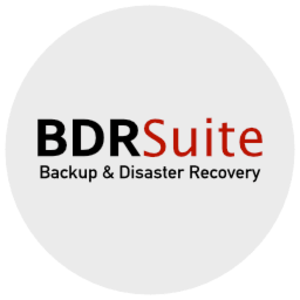What is our primary use case?
We're deploying it to support the backup of some on-premise VMware vSphere workloads.
How has it helped my organization?
Vembu has been a great benefit to us and it's been very positive. I would definitely say it's been a good thing.
What is most valuable?
We're using some very specific components of it like the on-prem backup to back up some separate systems for DR.
The restores have been reliable. We went through testing validation and we haven't had any issues.
We just started to use Vembu's Data Integrity Check. We need to validate the backups to see that they're able to be restored. This feature is pretty important. It's a big deal.
The restores have performed very well but our infrastructure is highly connected. Our infrastructure is the way it was before. We have a 10-gigabit infrastructure. So the performance of our backups has occurred the same as it did before, and it's been very good. We haven't noticed any difference between what we were doing before and with Vembu now.
It's important to us that Vembu provides multiple options to recover data during hardware failures or accidental deletion of files. But it's not critical because we back up the entire environment. So if we had a problem, we pull back the entire system. There's only a couple of instances where we pull back individual files. Being able to recover the entire virtual machine is the most important piece.
We used the Instant Boot VM feature for instant access to our VMs when we did the testing, but it's not necessarily something that I think is going to be an absolute requirement for us. It would be important if we lost everything
What needs improvement?
We do a lot of internal automation, so the Vembu API definitely has some gaps. The Vembu API could definitely use some improvement. We do rely a lot on automation outside of just the regular interface. We've noticed that the Vembu GUI is good, but we do leverage the APIs for a lot of stuff, and there's definitely some room for improvement there.
When it comes to the GUI, it could use some UI modifications to make it a little bit easier to navigate, filter, and sort information.
For how long have I used the solution?
We just made the purchase. We just went through the evaluation and we purchased it in the last two months.
What do I think about the stability of the solution?
So far, it has been very stable for us. We haven't had any problems.
What do I think about the scalability of the solution?
We're not a big shop. We don't scale to thousands and thousands of workloads, but it's scaled very well for the things that we've needed to do.
We're 100% into Vembu right now. I don't know that we'll be looking to do anything more. That all depends on what the infrastructure requires of us, but right now it's working very well. I don't think we're going to scale out and do Hyper-V, Office 365, or any of that stuff, at least not right now. If that does become a need, we'll be using Vembu for that because we know it can do that kind of work, but right now that's not in scope for us.
We have a little over 150-some odd workloads, virtual machines, and we have six hosts. Spread across six hosts, we have 150 workloads. It's not a big environment.
How are customer service and support?
Technical support was very good. We engaged them. They did respond very quickly. We were able to get them in and work through the issues that were there. They did have to go back to the team a couple of times to get some answers for us, but it was certainly no more than one business day between them going back, figuring out what's going on, and getting back with us. They were very good.
Which solution did I use previously and why did I switch?
We did use another solution but it was for the exact same kind of thing that we're using Vembu for.
It worked fine for a while but the updates weren't happening on a regular basis and the product wasn't moving forward the way that we wanted it to. Vembu has a lot more time under its belt in terms of development and whatnot. It turned out to be a much better solution for us.
How was the initial setup?
The initial setup was very straightforward.
Vembu has two options for deployment, Windows or Linux, and so we had looked at both options. Both options for setup and configuration were pretty straightforward. There were some bugs that needed to be worked out, so we had to engage the Vembu support team. That team engaged very quickly and worked diligently to get the issues resolved. There were two or three things that needed to be addressed. Ultimately, we chose to go down the path of Windows deployment for Vembu, not necessarily because there were problems with the Linux platform, but because the Windows platform seemed to work better for us for some of the automation that we're doing. Overall, it was very good.
The initial proof of concept to deployment was about a two-month venture for us. It was not very long.
Three people were required for the deployment. We're all engineers and I have the decision-making ability.
What was our ROI?
We have seen ROI. The real return is when something bad happens. All the proof of concept work that we did, all the testing we did, it all panned out for us. We're already seeing a return on that.
What's my experience with pricing, setup cost, and licensing?
They do have a pretty good breakdown online. Their product detail and data sheets and all that kind of stuff listed out pretty well what it does. So we knew right away that it was going to probably align with what we needed to do. It was pretty easy for us to understand how well it was going to be aligned.
I think it's priced well. Obviously, we're happy with the pricing.
Which other solutions did I evaluate?
There were a number of different technologies we looked at. They were all the same basic feature functionality that we were looking for. In some cases, it was the price. A couple of the products that we were looking at are more than twice the cost of Vembu. We're not a big environment so to pay twice the amount of money for effectively the same solution just didn't make a lot of sense for us. There are some less expensive solutions too but they didn't offer some of the automation that we needed. They didn't offer an API. They didn't offer as easy a path to getting into Vembu as Vembu offered. Vembu wasn't the least expensive and they weren't the most expensive, but it did align with what we needed. And a lot of what we needed was VMware and vSphere backups, automation, those kinds of things, and we felt that Vembu was the way to go.
We do have a tight budget. We're not a big shop or environment. It was very affordable. The cost was a big deal but it was very affordable for us.
What other advice do I have?
Look at it to align it with what you need it to do. See if it is well aligned with the way your infrastructure operates and the needs that you have with what Vembu can offer. Obviously price and budget are concerns, but I think that initially, it has to meet your needs. You're not going to go out and buy something that only gives you half of what you need. It's really all about evaluating the business needs first.
I would rate Vembu an eight out of ten.
Which deployment model are you using for this solution?
On-premises
*Disclosure: PeerSpot contacted the reviewer to collect the review and to validate authenticity. The reviewer was referred by the vendor, but the review is not subject to editing or approval by the vendor.






Thank you for the feedback. Good to know that our product has met all your backup requirements.
We have improved the Vembu BDR Suite user interface for the best user experience and added more APIs, which will be available in our next release v5.0. For any updates or queries, kindly get in touch with our team through vembu-support@vembu.com.